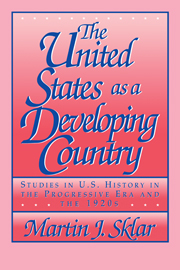 The United States as a Developing Country
The United States as a Developing Country Book contents
- Frontmatter
- Contents
- Preface
- I Periodization and historiography: The United States considered as a developing country
- II Studying American political development in the Progressive Era, 1890S–1916
- III Dollar Diplomacy according to Dollar Diplomats: American development and world development
- IV Woodrow Wilson and the developmental imperatives of modern U.S. liberalism
- V Some political and cultural consequences of the disaccumulation of capital: Origins of postindustrial development in the 1920s
- VI Disaffected with development: Henry Adams and the 1960s “New Left”
- VII The corporate reconstruction of American capitalism: A note on the capitalism–socialism mix in U.S. and world development
- Index
II - Studying American political development in the Progressive Era, 1890S–1916
Published online by Cambridge University Press: 03 February 2010
- Frontmatter
- Contents
- Preface
- I Periodization and historiography: The United States considered as a developing country
- II Studying American political development in the Progressive Era, 1890S–1916
- III Dollar Diplomacy according to Dollar Diplomats: American development and world development
- IV Woodrow Wilson and the developmental imperatives of modern U.S. liberalism
- V Some political and cultural consequences of the disaccumulation of capital: Origins of postindustrial development in the 1920s
- VI Disaffected with development: Henry Adams and the 1960s “New Left”
- VII The corporate reconstruction of American capitalism: A note on the capitalism–socialism mix in U.S. and world development
- Index
Summary
Today the questions that are uppermost, and that will become increasingly important, are not so much political as economic questions. The age of machinery, of the factory system, is also the age of socialistic inquiry. To me it seems that we are approaching a pivotal point in our country's history.
Frederick Jackson Turner, 1891The present finds itself engaged in the task of readjusting its old ideals to new conditions and is turning increasingly to government to preserve its traditional democracy. It is not surprising that socialism shows noteworthy gains as elections continue.
Frederick Jackson Turner, 1911Sometimes when I am asked to define myself, I say that I am a socialistanarchist – communist – individualist – collectivist – cooperative – aristocratic – democrat, for … the very complicated thing we call society is rolling forward along all these lines simultaneously.
Henry Demarest Lloyd, ca.1900In keeping with the social character of the advancement of knowledge, and in spite of a strong competitive impulse among scholars to magnify small differences into warring schools of thought, the leading historical writings in the past four decades have yielded substantial agreement on the identification of critical trends that were transforming U.S. society in the period of the 1890s to 1916. Implicitly, at least, they may well have been anticipating the way to resolving some latest of these small differences before they get too far out of hand, such as that between “social history” and “political history” and, in a variation upon the theme, that between “society-centered” (or “movement-centered” or “interestcentered”) and “state-centered” history.
- Type
- Chapter
- Information
- The United States as a Developing CountryStudies in U.S. History in the Progressive Era and the 1920s, pp. 37 - 77Publisher: Cambridge University PressPrint publication year: 1992
- 1
- Cited by


